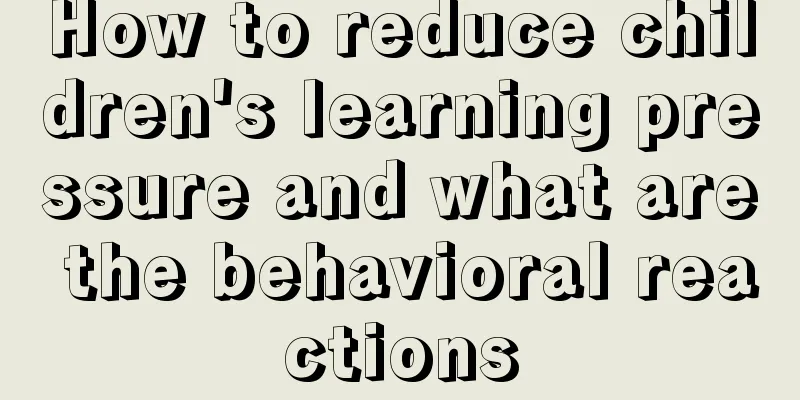How to reduce children's learning pressure and what are the behavioral reactions

|
Children may feel pressured by exams during school, which may lead to anxiety, poor sleep and other problems. Parents can help their children to relax. So how to reduce children's learning pressure? What are the behavioral responses? How to reduce stress in children Recognize symptoms of stress: As a parent, you should understand the differences between your child’s daily behavior and when facing exams, such as anxiety, abnormal eating habits, etc., so that you can help your child at the first opportunity.Make sure your child eats properly: When children are stressed, they may not be able to eat or may crave junk food. Therefore, it is important to make sure your child eats the right food, especially healthy and nutritious food.Help your child sleep: Stress can disrupt your child's sleeping pattern and keep him awake, but lack of sleep may only have the opposite effect. Therefore, require your child to get at least 8 hours of sleep and help him do some relaxing activities, such as listening to music or watching TV for a while.Stay calm: As a parent, you know which subjects your child is weak in, but stay calm. If you worry too much, it may make your child more stressed. If you can relax, you can take care of your child and help him deal with stress.Help your child review: To reduce your child's exam pressure, you can also help your child review. Use your previous learning experience to help your child grasp the key points and let your child quickly grasp the essence.Develop a study habit: Studying should be a daily habit, not a last-minute habit. Encourage your child to have a fixed study time every day and help him make a schedule.Discuss fear expectations: If your child is overly worried and anxious, try to share with him your experience in overcoming stress and help him find the source of stress and solve it. Let your child know that your expectations are not just about grades.Teach how to take notes: Teach children how to take study notes correctly and how to list the more important points, so that when children take exams in the future, they can have notes to quickly review the key points.Children have stressful behavioral responsesLoss of appetite: Loss of appetite is a common symptom of stress, whether in children or adults. Because of the stress, the appetite will be poor, and sometimes vomiting may occur.Abnormal emotions: When children are under stress, they may become anxious, uneasy, and irritable. In severe cases, they may exhibit destructive behavior, violence, lying, etc., so special attention should be paid.Insomnia or poor sleep: When you are under great stress, sleep is also the most directly affected part. Children may suffer from insomnia or poor sleep, and in serious cases, they may even become ill.Symptoms of illness: Stress can cause a variety of health problems, such as gastrointestinal discomfort, headaches, or vomiting. If the symptoms are too severe, you may need to see a doctor.How to avoid stressing your childDon’t over-indulge: Too much love can also put pressure on children, making them feel overwhelmed and unable to bear it. At the same time, it can also make children lose their ability to be independent.Avoid overprotection: Children will grow up over time, and parents should also learn to adjust their protection of their children over time. Don't let your children lose the opportunity to explore the world and prevent them from growing up because of overprotection.Don't have too high expectations: every child is unique, and has his own suitability and his own strengths. Parents should understand and discover the direction that suits their children and help them work hard.Good time management: Parents should help their children manage their time well, combine movement and rest, and not focus on one thing for a long time. Some children like to watch TV and play games, so they should be appropriately restricted.Encourage children to express themselves: Encourage children to express their feelings, understand their feelings, help them vent, and gradually cultivate their ability to manage emotions. Learn to understand your child's thoughts, which will help you better deal with your child's problems.Give understanding and tolerance: Parents should be more tolerant of their children and teach them how to deal with mistakes instead of just scolding them. Too much criticism and scolding will also put heavy psychological pressure on children. |
>>: How to praise children correctly, what are the principles and techniques
Recommend
What is fetal toxin? What are the harms of fetal toxin?
Everyone must have heard of fetal toxicity in lif...
What to eat to stimulate the appetite of children with anorexia? Treatment of anorexia in children
Children's inability to eat or not eating wel...
What should I do if my child has ADHD? ADHD coping methods
ADHD is a common disease that many children suffe...
Which children are prone to calcium deficiency? To supplement calcium, don't be picky about food
In the process of children's growth, calcium ...
How to identify the authenticity of the world's best rice noodles? How to compare the authenticity of earthsbest rice noodles
earthsbest world's best rice noodles are a ty...
Why is Shuke toothpaste expensive? Which Shuke toothpaste is the best?
The actual user experience of Shuke toothpaste is...
What are the effects of parents' divorce on children?
Parents are the most important people to children...
What should I do if I have corpus luteum deficiency? How can I treat corpus luteum deficiency with diet?
Corpus luteum deficiency refers to insufficient s...
What should I do if my baby has indigestion? What should I do if my baby has dry stools?
Adults often suffer from indigestion when eating,...
Moms should pay attention to scientific preparation for pregnancy. Girlfriends' experience is not entirely correct.
Preparing for pregnancy is a big deal for both hu...
Can pregnant women not eat spicy food? Why can't pregnant women eat spicy food?
We all know that pregnant women need to pay atten...
Why is my baby's hair growing unevenly? What can I eat to make my baby's hair darker?
When a baby is born, his hair is very sparse. Aft...
Do babies need to drink water after drinking milk powder? How much water should babies drink every day?
Babies are very fragile and we must take good car...
Can I take birth control pills while breastfeeding? What should I do if I do?
If you don't take any contraceptive measures ...
What vegetables can increase milk production? What vegetables are good for increasing milk production?
Babies during breastfeeding have a strong need fo...









